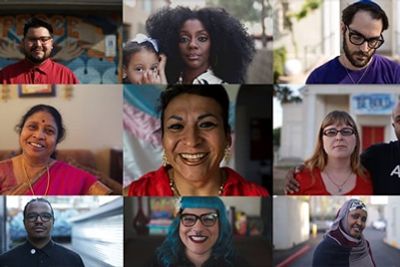By Hans Pedersen, May 2018 Issue.
Nobody knows what it’s like to walk in the shoes of a person of a different cultural, racial, ethnic, sexual, gender and religious identity than their own. But the collection of voices in the new film You Racist, Sexist Bigot., produced and directed here in the Valley, aims to give folks a better idea of what it’s like. For Echo's complete coverage of the film, visit "All We Want is Justice, All We Need is Love."
Directed by Pita Juarez and Matty Steinkamp, the movie with a frank, assertive title is an amalgam of stories about the hate speech different people have suffered. The opening moments sets the scene of the striking instance when the 2017 Phoenix Pride Parade in central Phoenix was disrupted. The filmmakers return to that protest at Phoenix Pride later in the documentary.
You Racist, Sexist Bigot. is not built on a traditional linear narrative as much as it presents a challenging collection of racist, sexist and bigoted – literally deplorable – comments. The faces of the individuals being interviewed are framed in medium close-ups, their eyes locked with the viewers, as they chronicle the hateful remarks they’ve endured.
Some comments are stupid and thoughtless, others are outright cruel. When a non-Anglo person says she was born in the U.S., and the response is “No, but where are you really from?”… Or when someone meets a black mother and asks her, “Is the child’s father still in the picture?”… it ought to be clear, these are prejudiced remarks.
One man talks about the Korean heritage he once shunned and now embraces with deep appreciation. A woman explains how everyone in her Filipino family experiences race in a very different way, simply because each family member has a different skin tone and appearance.
You may recognize one or two of the people interviewed. Or perhaps you have personal accounts of hearing some of the offensive comments they recall.
Recognizing the racial motivation behind such remarks is just part of the purpose of this valuable documentary. Subjects share more than just hate speech, and as the movie unfolds, individuals elucidate their life experiences.
Two lesbians of different ages share their vastly different coming out stories. A Sikh man talks about the significance of his turban. And a Native American man explains that protecting the land is his given duty.
Steinkamp’s musical bridges also serve remarkably well as a way of uniting the various stories, giving the documentary a powerful, emotional core.
But the overarching narrative that does tie together these disparate accounts is that of Karyna R. Jaramillo, a Latina trans activist who wishes her family would accept her. She’s a member of Trans Queer Pueblo, a group that serves the LGBTQ community in the Valley.
Karyna points out how ostracized she is and explains she cannot get close to any men or youngsters because people assume the worst of her.
She and other activists create signs that say “No Justice, No Pride – No Justicia, No Orgullo” for their protest, culminating in one dramatic day that unfolds near the end of the documentary.
In her colorfully embroidered outfit, Karyna heads to the protest on a sunny April weekend in Phoenix. She and other protesters unfurl two large banners across the street and stop the Pride parade in its tracks. The filmmakers note that people attending Pride started screaming in the faces of Karyna and the other activists.
The disruption of the parade is also captured in black-and-white still photos. It’s hard not to notice that it’s mostly white people who apparently felt it was necessary to jump into the mix and shout at the Latino activists. The stark images in the film clearly highlight the racial tensions in our community.
As the closing credits start to roll, the filmmakers explain in captions on-screen that part of the purpose of the disruption was “to end police collaboration.”
If anything, the film would benefit from additional details about the activists’ strategy and their decision to block the parade in the middle of the street. It was a powerful moment to see on camera — a protest that, by happenstance, this reviewer witnessed in person.
Speakers in the movie also address the issue of African-Americans who are dying in officer-involved shootings. They touch on such disparate issues as the institutionalized sexism that put woman at a disadvantage, or the way LGBTQ people may sometimes feel pressure to perform good deeds, due to negative messaging about their inherent value.
As a political work, the film excels, broadening the viewer’s horizons in impressive ways, yet as an aesthetic piece, it is less successful. On one hand, protest footage in a kaleidoscope of formats lend the film a striking, edgy, ‘70s vérité feel. On the other hand, the echo effect at the end of a magical Maya Angelou’s inauguration day speech is gimmicky and diminishes its stature. Still, the strong melodies elevate the film, ultimately unifying some of the disparate elements, binding together everybody’s testimonies.
Ultimately, more details about the strategy to block the march might enhance the overarching narrative about Karyna and the protesters, and could strengthen this already powerful documentary.
People get sick of being treated differently because of the color of their skin – just as people get sick of reactions when gender role expectations are not met. By deftly centering the movie around Karyna, the movie – billed as “a film to raise consciousness” – helps give those sentiments a voice. And it’s important to listen.
Meet The Cast
For Echo's interview with Miguel Arriaga, click here.
For Echo's interview with Karyna R. Jaramillo, click here.
For Echo's interview with Gabriel Scabby, click here.
For Echo's interview with Juli Myers, click here.
